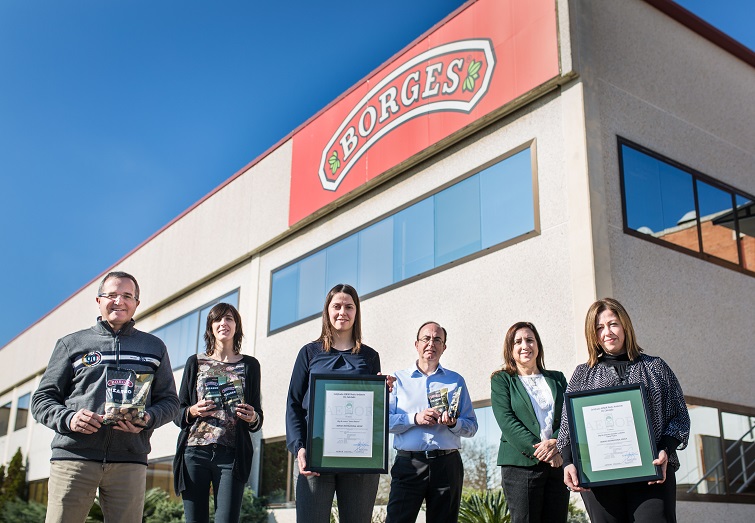
News

Borges International Group consolidates its commitment to the environment
AENOR has delivered the certificate of the Carbon Footprint to Borges International Group. The document certifies the accuracy of the calculation that the company has made of the carbon footprint in all phases of the production process for Pizarro walnuts and pistachios.
This certificate, based on the ISO / TS 14067 standard establishes requirements and guidelines for quantification, verification and communication of the carbon footprint of a product.
The ceremony certificate AENOR took place last Thursday, January 21 at 12pm on the premises of Borges International Group in Reus.
The event was attended by Joan Fortuny, Director of Nuts Division, Joan Ribé, Director of Corporate Strategy, Victoria Morales, Director of Human Resources, and Eva Subirá, Director of AENOR in Catalonia.
The importance of vertical integration
Borges International Group has developed a study to determine the carbon footprint of its production of pistachios and walnuts Pizarro. The study, launched in late 2014, is used to determine the environmental impact of the process on greenhouse gas emissions (GHG) emissions that affect climate change and to establish performance measures.
The vertical integration throughout the manufacturing process and pistachio nut is key to calculate and improve (with action plans and follow-up) the impact of the processes involved from the “farm to table” on the environment and the environment. The availability of own farms allows the company to carry out the pre-processed nuts (peeled and dried) at lot, so avoiding transport and CO2 emissions are significantly reduced.
In the calculation, we have also identified the most influential stages in the emission of greenhouse gases, as well as areas for improvement and have established reduction plans to contribute significantly to mitigating climate change as:
- Optimize the use of fertilizers
- Optimize energy consumption in both the fields and the packing facilities
- Optimize transportation routes from aa farms and factories use a modern fleet of trucks
- Review the design of the cartons used for packaging in order to reduce the weight and / or printing inks
- Check the cooling system to reduce the need to recharge the refrigerant gas
- Optimize the number of journeys and improve the energy efficiency of vehicles and equipment used in the collection process.
Overall, AENOR has certified more than 200 carbon footprints of products, organizations, services and events, which Borges International Group is now added.
The advantages of certification of the carbon footprint are:
– Allows to know and control emissions of organizations and their products
– Improve competitiveness
– Improve transparency to third parties
For a product also opens international markets, resulting in their consumption decisions and better assessment of its marketing operations.
Las políticas medioambientales europeas e internacionales, en su compromiso con la reducción de las emisiones de gases efecto invernadero (GEI), están apostando por la obligatoriedad de la certificación de la huella de carbono en los alimentos. Aunque todavía no es una obligación, todo apunta a que así lo será en el futuro.
RSC y compromiso con el medio ambiente
Social Responsibility is key to Borges International Group. For years, Borges facilities in different solidarity activities, among which the campaigns to collect toys are held and food, the blood donation campaign “Red Day”, literary contests and drawings to celebrate the Sant Jordi with the sons and daughters of workers, or the health and nutrition program “Borges Cares” based on three pillars: nutrition, health and sports.
Throughout the years Borges International Group has received several awards for his work: the Flexible Company Award 2015 awarded by the Ministry of Health, Social Services and Equality, Atlante Award for Occupational Risk Prevention (2014) or FIDEM Awards 2014 Award for Reconciliation. Also the distinctive ‘Equality in the company’ awarded by the Ministry of Health, Social Policy and Equality (2010 and 2011) or the Healthy Work Environment Prize, in its 1st edition.
